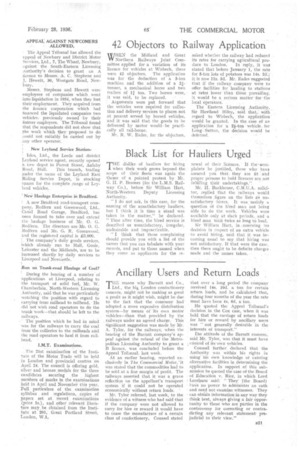Ancillary Users and Return Loads
Page 35

If you've noticed an error in this article please click here to report it so we can fix it.
Treason why )3arratt and Co., Ltd., the big London confectionery concern, might net be making as great a profit as it might wish, might be due to the fact that the company had' adopted a more expensive distribution system—by means of 'its own motor vehicles—than that provided by the railways under an agreed charge. This significant suggestion was made by Mr. A. TylOr, for the ,railways, when the hearing of the Bar/Tilt company's appeal against the refusal of the Metropolitan Licensing Authority to grant a B licence, was concluded before the
Appeal Tribunal, last week. • •
At an earlier 'hearing, reported exclusively in The Commercial Molar ,''it was stated that the commodities had to be sold at a fine margin of profit. The railways asserted that it was a grave reflection On the appellant's transport system if it could not be operated economically without return loads.
Mr. Tylor referred, last week,to the evidence of a witness who had said that if the company were not allowed to carry for hire or reward it would have to cease the manufacture of a certain class of confectionery. Counsel stated that over a long period the company received 14s. 10d. a ton for certain return loads, and he cakulated -that, during four months of the year the rate must have been 4s. 6d. a-ton.
He quoted the Appeal 'Tribunal's decision in the Cox case, when it was held that the carriage of return loads for hire or reward • by ancillary users was " not generally desirable in the interests of transport."
The attitude of the Barratt concern, said Mr. Tyler,. was that it must have cc:intro] of its'own vehicles.
Counsel • further declared that the Authority waS within his rights in using' his Own knowledge of existing alternative facilities in _determining the application. In support of this submission he quoted the case of the Board • of Education v. Rice, in which Lord Lerelnirir said: "They' (the Board) have no -power to administer an oath and-need not examine witnesses. They can obtain information in any way they think best, always giving a fair Opportunity to those who are parties in the controversy for correcting or contradicting any relevant statementprejudicial to their view."




























































































